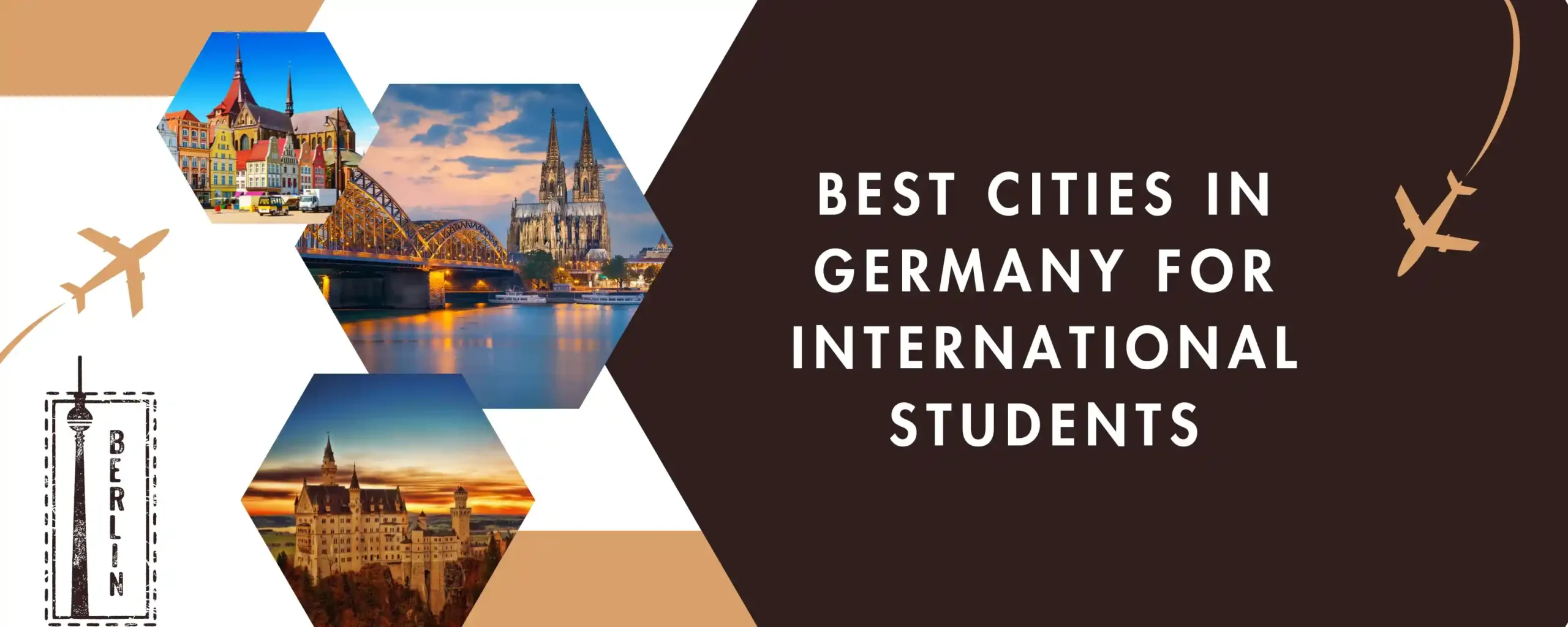Dreaming of premier education without the expensive price tag? Well, Germany is your answer! It is a top destination for international students, offering affordable (often free!) education, globally recognized universities, alongside an excellent quality of life. This article will help you navigate Germany’s best cities, considering important factors like affordability, academic excellence, vibrant student life, and promising job prospects. Get ready to discover your perfect German study destination! Let’s go.
Why Study in Germany?
Germany is renowned for its exceptional education. This reputation is built on high and competitive academic standards, a strong emphasis on practical application, as well as cutting-edge pioneering research. Many public universities offer no tuition education or very low-cost education for international students, making it an incredibly attractive and affordable study destination compared to other developed nations.
Graduates not only benefit greatly from Germany’s strong economy, particularly its tech and automotive sectors, but also benefit from its industrial connections with companies like Siemens, Bosch, BMW, and Volkswagen. Germany also offers a diverse cultural environment to its students. International students can also benefit from generous post-study work opportunities, with an 18-month job-seeking visa allowing them to find relevant employment after graduation!
Factors Considered for Ranking These Cities
When choosing your German study city, take the following factors into consideration:
- University Reputation: Look for cities with highly-ranked universities in your field, known for their research and industry connections. Example: Munich (TUM, LMU), Berlin (Humboldt, Free University, TU Berlin), and Aachen (RWTH Aachen).
- Cost of Living: Big cities like Munich and Frankfurt are more expensive for rent and daily expenses (around €1,200/month). Smaller cities like Leipzig, Dresden, or Jena offer comparatively lower costs (€700-€950/month).
- Student-Friendly Atmosphere: Ask yourself “Do I prefer a bustling metropolis (Berlin) or a quieter university town (Heidelberg)?”. Look for cities with good public transport, availability of student discounts, and a lively student community.
- Career Opportunities: Career opportunities available in select cities should also be a consideration. For example: cities like Munich (automotive, tech), Frankfurt (finance), and Berlin (startups, digital) offer strong job markets. Align your city choice with your career aspirations.
- Cultural Attractions: Germany is rich in history and culture. Choose whether you want vibrant nightlife (Berlin), historic charm (Heidelberg, Dresden), or a mix of both!
Top 10 Cities for International Students in Germany
1. Berlin

Top Universities
- Free University of Berlin
- Humboldt University of Berlin
- Technical University of Berlin (TU Berlin)
Cost of Living
Students must expect to pay around €900-€1,300 per month, with rent being the largest expense. Shared accommodation can significantly bring these costs down.
Student Life & Culture
Berlin, being a melting pot of cultures, offers a diverse and dynamic student life. From world-class museums and historical sites to a spectacular nightlife scene with countless clubs and bars, there’s always something happening here!
Areas like Kreuzberg, Neukölln, and Mitte are popular student hangouts with vibrant cafes, independent shops, and cultural events. The city’s extensive public transport system also makes it easy to explore and get around without spending too much.
Job Opportunities
As Germany’s capital, Berlin has a strong growing job market, especially in the startup sector, IT, digital media, e-commerce, and creative industries. Students can find numerous part-time jobs in hospitality, retail, and language-related services. Internships are abundantly available, particularly in tech and marketing roles, providing valuable experience.
2. Munich

Top Universities
- Technical University of Munich (TUM)
- Ludwig Maximilian University of Munich (LMU)
Cost of Living
Munich is one of Germany’s most expensive cities, therefore has a high cost of living. Expect monthly expenses to range from €1,000-€1,600, with accommodation being particularly pricey.
Student Life & Culture
Munich blends traditional Bavarian charm with modern sophistication. Students can enjoy beautiful parks like the English Garden, world-class museums, and a thriving beer garden culture. Oktoberfest, though famous, is just one of many cultural events. The city is very safe, clean, and has an excellent well-connected public transportation network.
Job Opportunities
Munich is an economic powerhouse with an emphasis on automotive (BMW, Audi), engineering, IT, aerospace, and finance sectors. These industries also offer several internship opportunities and career prospects for graduates. Part-time jobs for students are available in hospitality, retail, and administrative roles. Its strong economy ensures a competitive, yet rewarding, job market for international graduates.
3. Frankfurt

Top Universities
- Goethe University Frankfurt
- Frankfurt School of Finance & Management
Cost of Living
As a major financial hub, expect expenses similar to Berlin or Munich, around €950-€1,400 per month, with accommodation being the primary expense.
Student Life & Culture
Frankfurt is a bustling, modern metropolis offering a diverse cultural scene with numerous museums (Museumsufer), vibrant nightlife, and green spaces along the Main River. The city’s central location makes it an excellent base for exploring other parts of Germany and Europe. The city is well-connected by public transport.
Job Opportunities
Frankfurt is Germany’s financial capital, and is home to reputed financial institutions such as the European Central Bank, Deutsche Bank. This makes it a hub for careers in finance, banking, consulting, and law. Beyond finance, there are also opportunities in IT, logistics, and marketing. Part-time jobs for students are plentiful in the service sector. Graduates with degrees in finance, economics, and business will find excellent long-term career prospects here.
4. Hamburg

Top Universities
- University of Hamburg
- Hamburg University of Technology (TUHH)
Cost of Living
Similar to Berlin, expect to spend around €900-€1,300 per month.
Student Life & Culture
Germany’s second-largest city, Hamburg, combines Hanseatic charm with a vibrant atmosphere. The city boasts a thriving music scene, and a diverse nightlife. Areas like St. Pauli and Sternschanze are popular with students for their lively bars and cafes.
Job Opportunities
Hamburg is particularly strong in logistics, aerospace (Airbus), media, IT, and international trade. Students can find internships and part-time jobs in these sectors, as well as in the service industry.
5. Heidelberg

Top Universities
Heidelberg University
Cost of Living
Students can expect to pay around €850-€1,200 per month. Rent can be competitive due to its popularity as a student town. So make sure to grab those shared accommodations ASAP!
Student Life & Culture
Heidelberg is Germany’s oldest university town. Dominated by its famous castle ruins this city offers a picturesque setting. Student life is deeply integrated and intertwined into the town, with numerous student pubs, traditional festivals, and a strong sense of community. It’s an ideal choice for those seeking a more traditional, close-knit university experience rather than the fast-paced life of a big city.
Job Opportunities
While not a massive industrial hub, Heidelberg offers opportunities in research, biotechnology, pharmaceuticals, and IT. Major companies like SAP also provide opportunities. Part-time jobs for students are common in tourism and hospitality.
6. Cologne

Top Universities
- University of Cologne
- Cologne University of Applied Sciences
Cost of Living
Remember to budget around €850-€1,200 per month. Rent is more affordable than in Munich or Frankfurt.
Student Life & Culture
Cologne is a lively and welcoming city with a youthful energy. Students can enjoy a bustling nightlife, with several bars and pubs, as well as a rich cultural scene with museums, art galleries, and concerts. The city is very well-connected by public transport.
Job Opportunities
Cologne’s economy is diverse, with strengths in media, automotive, chemical industries, and insurance. Students can find part-time jobs in retail, hospitality, and the service sector. Graduates in business, media, communications, and engineering have diverse career opportunities in the palm of their hands!
7. Stuttgart

Top Universities
- University of Stuttgart
- Hohenheim University
Cost of Living
Similar to Hamburg, expect to spend around €900-€1,300 per month, with accommodation being the major expense.
Student Life & Culture
Stuttgart is the heart of Germany’s automotive industry. This city offers a high quality of life, beautiful green valleys, and a strong cultural scene with opera, ballet, and diverse variety of museums (including the Mercedes-Benz and Porsche museums!). Student life is active around the universities, and the city is known for its excellent vineyards and regional cuisine.
Job Opportunities
Stuttgart is a global center for automotive engineering (Mercedes-Benz, Porsche), mechanical engineering, and high-tech industries. This makes it an excellent choice for engineering students. There are varied internship and job opportunities in research & development, production, and IT within these sectors. Part-time jobs related to the manufacturing and service industries are available easily.
8. Dresden

Top Universities
- Technical University of Dresden (TU Dresden)
- Dresden University of Applied Sciences
Cost of Living
Dresden is one of the more affordable major cities in Germany, with monthly expenses ranging from €750-€1,000.
Student Life & Culture
Known as the “Florence on the Elbe”, Dresden houses stunning Baroque architecture. Not only this, the city has a rich history along with a lively and growing student scene. The Neustadt district offers vibrant nightlife, quirky cafes.
Job Opportunities
Dresden has emerged as a major hub for microelectronics, IT, and biotechnology. Companies like GlobalFoundries have a strong presence in this city and offer excellent internship and job prospects, particularly for students in engineering, computer science, and natural sciences. Here, part-time jobs are available in hospitality and the ever-evolving tech sector.
9. Leipzig

Top Universities
- University of Leipzig
- Leipzig University of Applied Sciences (HTWK Leipzig)
Cost of Living
Leipzig is one of Germany’s most budget-friendly cities, with monthly expenses often ranging from €700-€950.
Student Life & Culture
Leipzig is a vibrant and creative city, dripping with youthful energy. Leipzig, often called “New Berlin”, has a rich musical heritage (home to Bach, Mendelssohn) and a lively nightlife. The city also boasts a laid-back atmosphere.
Job Opportunities
Leipzig’s economy is growing, with strong industry networks in automotive (BMW, Porsche production plants), logistics, media, and renewable energy. Its affordability deems it an attractive place for graduates looking to enter the job market, especially in logistics, IT, and manufacturing.
10. Aachen

Top Universities
RWTH Aachen University
Cost of Living
Students can expect to pay around €850-€1,100 per month.
Student Life & Culture: Aachen is a historic city known for its impressive Cathedral – a UNESCO World Heritage site. and its strong connection to Charlemagne. Student life is centered around the university, with numerous student organizations, traditional pubs, and a close-knit international community. Its location near the borders of Belgium and the Netherlands also offers several unique cultural exchange opportunities.
Job Opportunities
Aachen is a leader in engineering and research, due to RWTH Aachen University’s strong ties to industry giants. Major employment opportunities exist in mechanical engineering, electrical engineering, automotive, and materials science sectors. While not as diverse as big cities, the specialized industries offer very high demand for skilled graduates in technical fields. Part-time jobs are available, often within the university or local businesses.
Life as an International Student in Germany
Navigating Germany as an international student can be both exciting as well as a daunting task. Why? Well, while English is spoken in universities, one must stay aware of initial language barriers outside university. Learning German can be significantly beneficial for you. It can enhance your daily life experiences – aiding not only in social integration but also improving career prospects. Remember that the German public transport system is excellent, and your student ID will grant you valuable discounts on everything from museums to public transport! Moreover, studying in Germany will open you to exploring Europe as well! Learning additional languages, apart from German, like French can significantly enhance your linguistic and cultural experiences while in Europe. Consider platforms like La Forêt Education for structured guided language courses and interesting cultural insights!
Conclusion
As stated, Germany is a premier study destination, known for its affordable, world-class education and strong career prospects. Cities like Berlin offer a vibrant, diverse experience for tech and creative fields, while Munich is a leader in engineering. Frankfurt is a finance hub, and Heidelberg provides historic charm. Each city listed here offers unique academic, cultural, or career opportunities. So how do you choose the best city for you? Well, consider your academic goals, budget, and lifestyle preferences to find your perfect fit. Choose a city and be one step closer to your German dreams! Los geht’s!
Did You Know?
- Hamburg was an early home for the Beatles!
- Oktoberfest, the world’s largest folk festival, is held in September in Munich.
Frequently Asked Questions
1. Do German universities have many on-campus dorms like in some other countries?
Ans: Not typically! Most students in Germany live in shared apartments (called WGs – Wohngemeinschaften) or private student housing. This is a big part of the German student experience and a great way to meet people.
2. Are there affordable food options for students at universities?
Ans: Yes! German universities have a strong “Mensa” (cafeteria) culture. These university cafeterias offer subsidized, often delicious, and diverse meals for students, making eating out very affordable.
3. Is it true that some Bachelor’s degrees in Germany have open admission?
Ans: Well, yes! This is true for some subjects. While popular fields and Master’s programs are highly competitive, some Bachelor’s degrees at public universities don’t have a strict GPA cut-off. You might just need to meet basic eligibility requirements.





